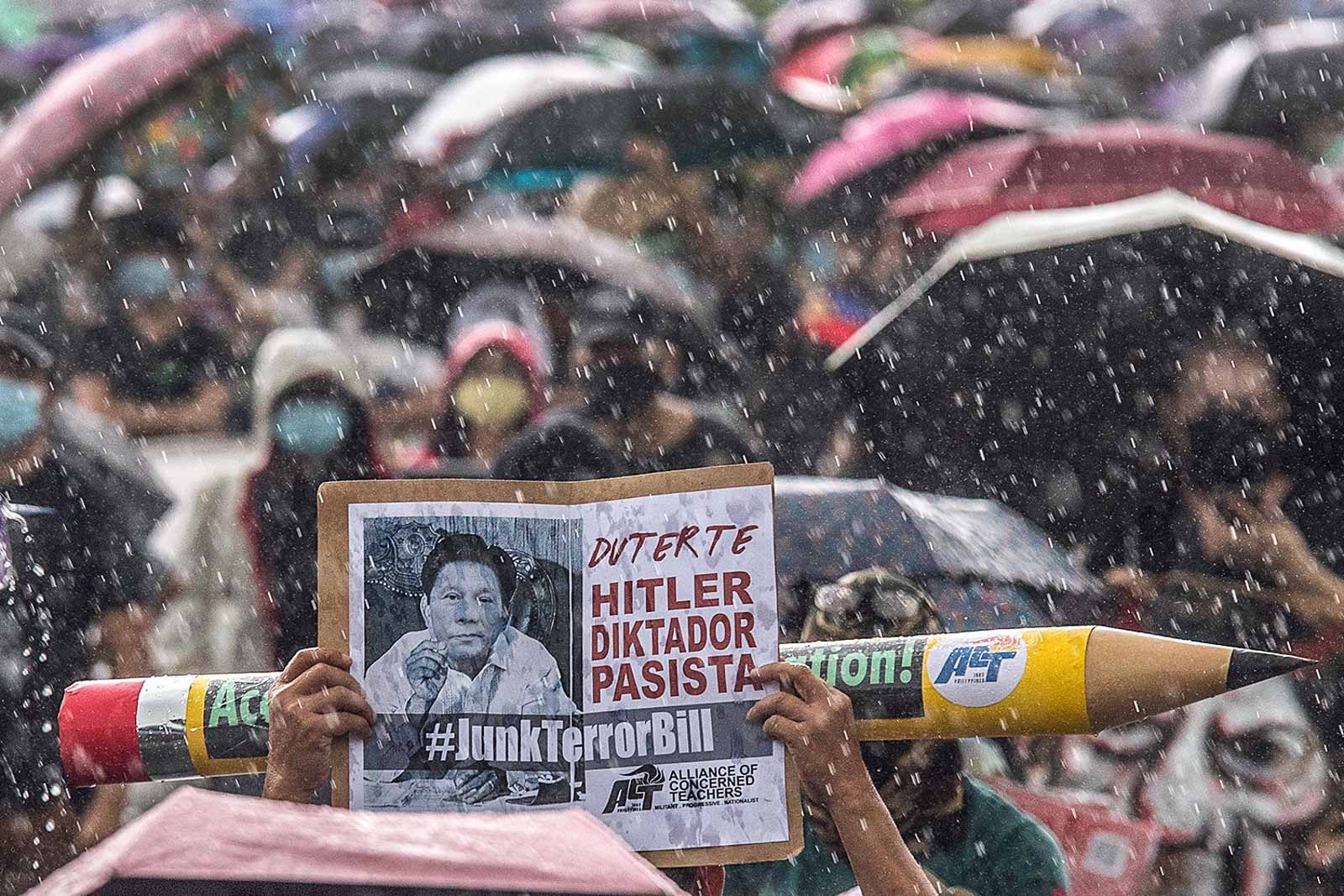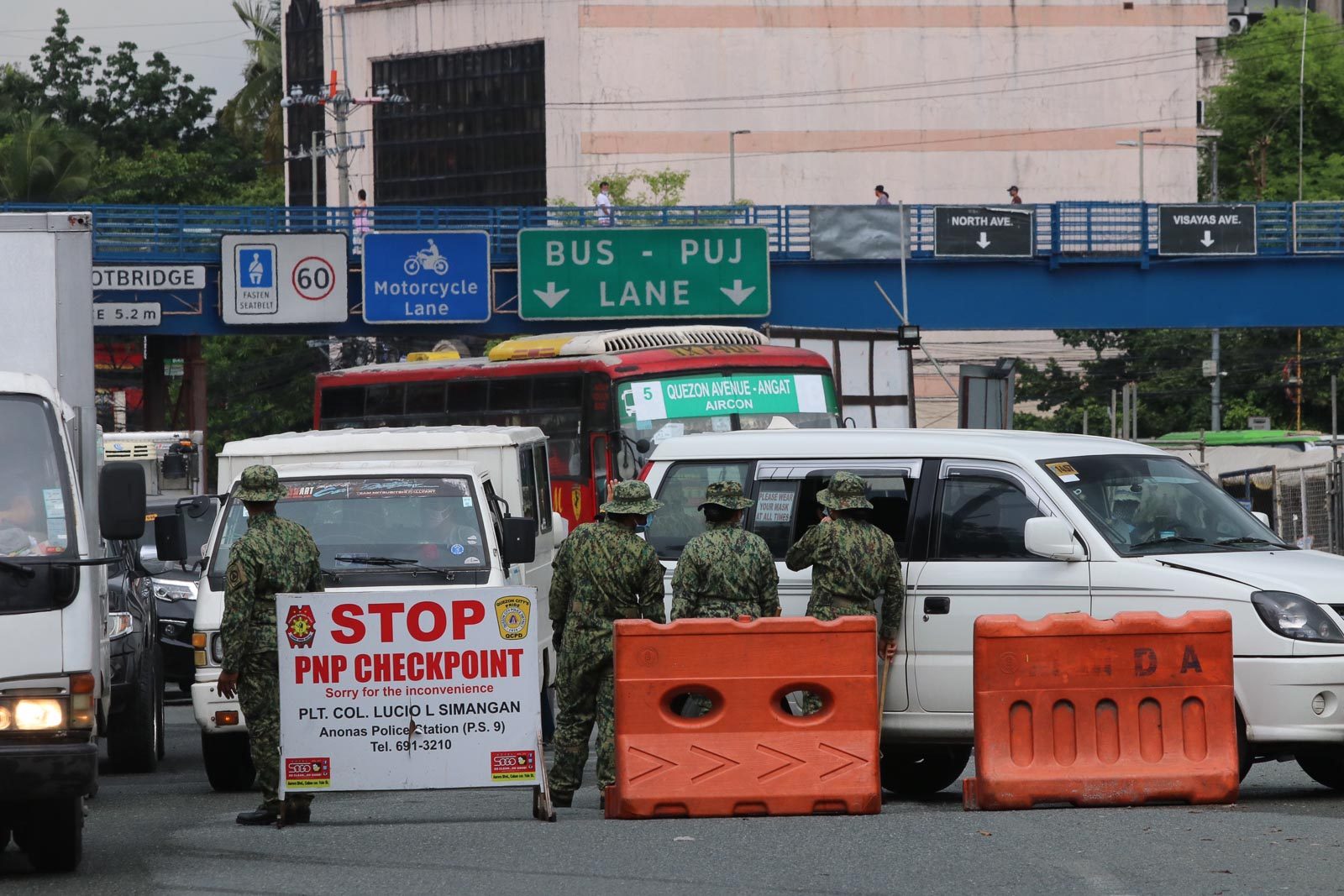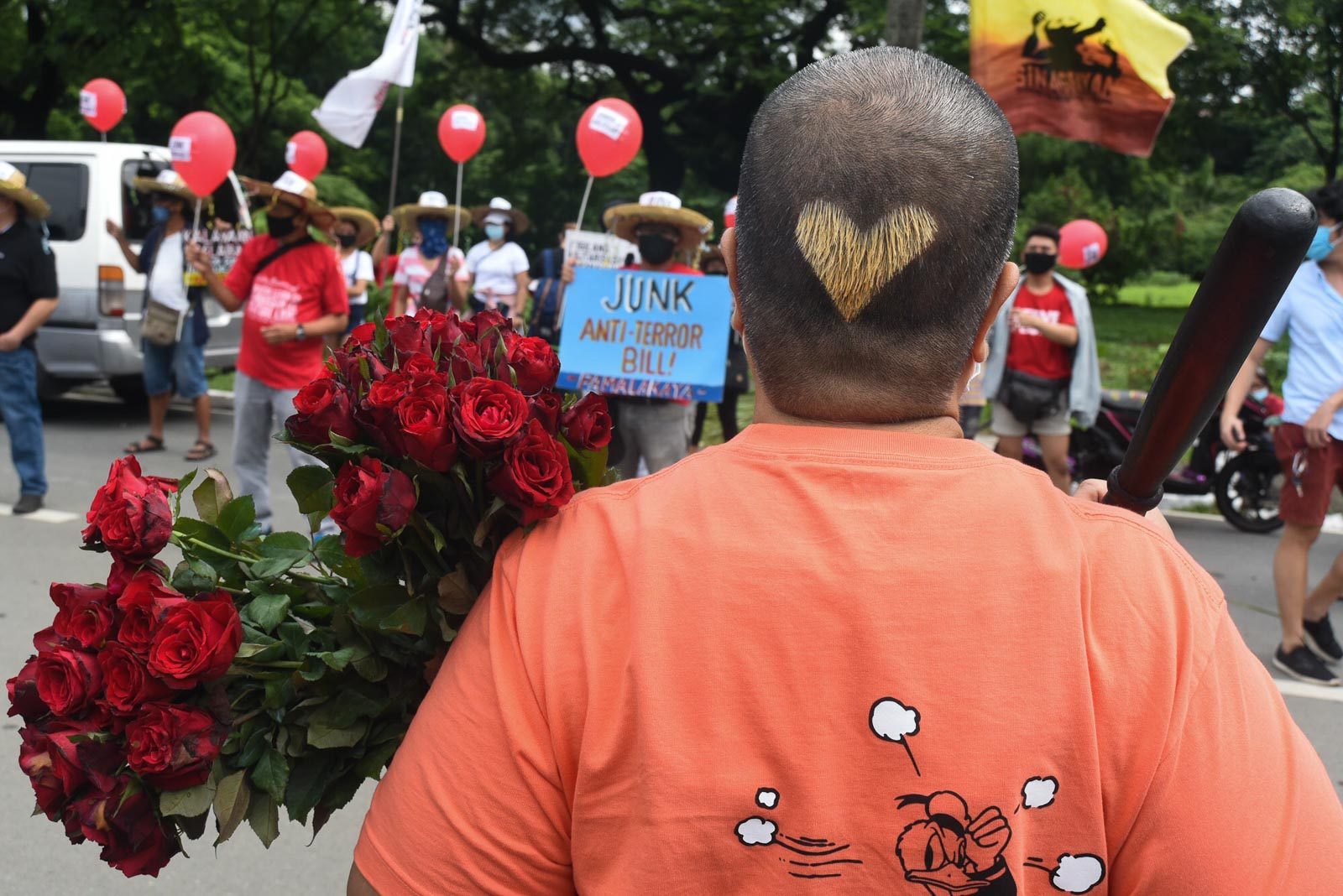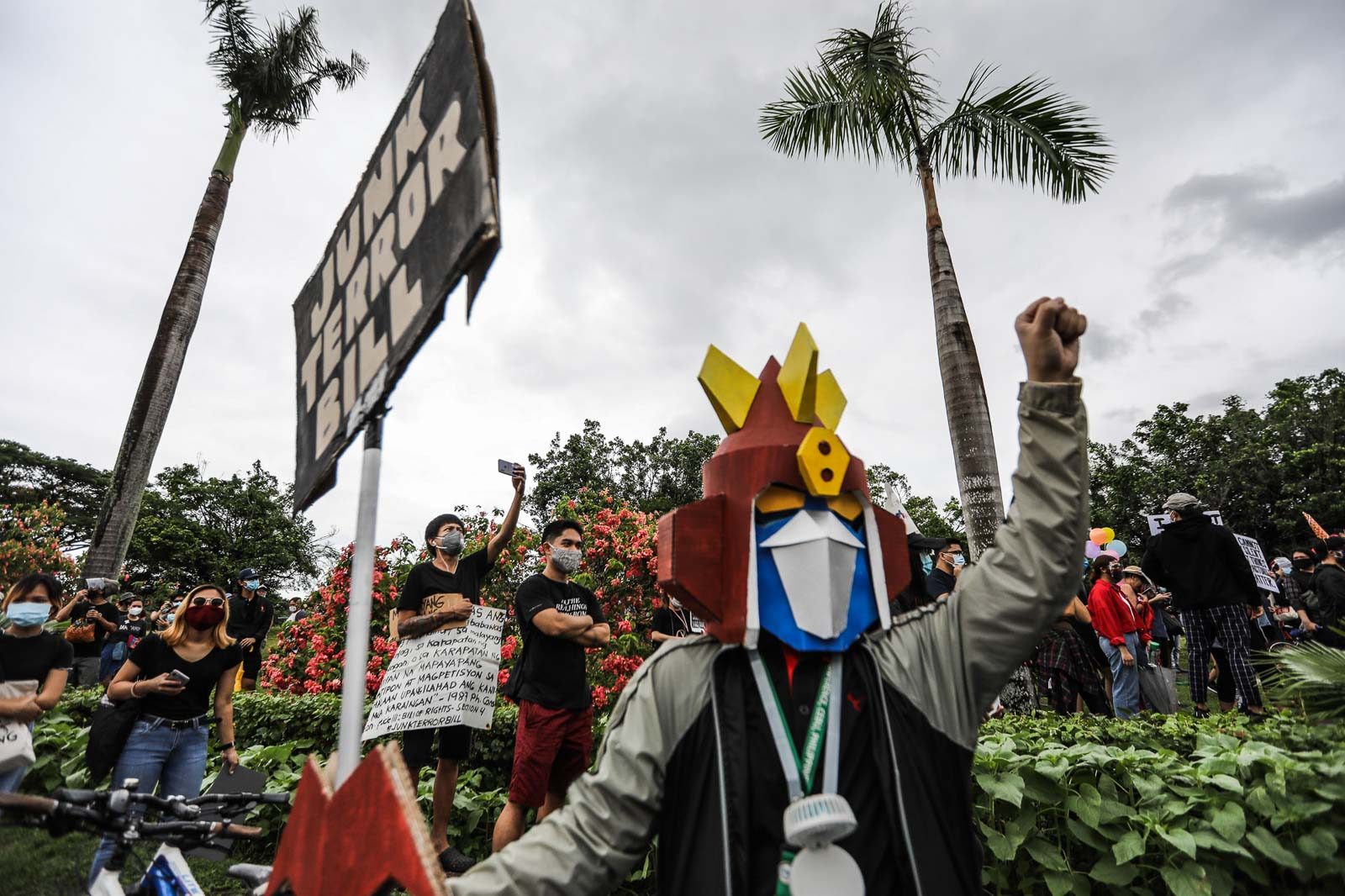SUMMARY
This is AI generated summarization, which may have errors. For context, always refer to the full article.

MANILA, Philippines (UPDATED) – The morning on Friday, June 12, started out a little tense – police checkpoints were set up along Commonwealth Avenue to scrutinize the people trying to enter the University of the Philippines (UP) Diliman campus where protesters were set to converge for the Independence Day rallies.
Quezon City Police District (QCPD) vehicles patrolled the area, and a couple of them stopped in front of the Commission on Human Rights (CHR) where dozens started to gather.
Before 9 am, QCPD chief Brigadier General Ronnie Montejo stopped by the CHR and told reporters they would be forced to make arrests if crowds would not disperse on their order.
Montejo was echoing the day’s warning from Philippine National Police (PNP) chief General Archie Gamboa that they would strictly enforce a prohibition on rallies. They have the legal backup of Justice Secretary Menardo Guevarra who cited, albeit not specific, “penal sanctions under public health laws.”
“Kakausapin natin sila to disperse. Kung hindi, mapipilitan tayo. Papunta doon [sa arestuhan] kung hindi nila susundin ang guidelines ng IATF (Inter-Agency Task Force,” said Montejo, and immediately left to inspect the area further.
(We will tell them to disperse but if they don’t, we will be forced. We are heading toward [arrests] if they don’t follow IATF guidelines.)
The morning was still relatively quiet, when a small crowd from the Philippine Alliance of Human Rights (PAHRA) gathered at the roadside of Commonwealth Avenue near UP’s University Avenue, and chanted against the anti-terror bill.
A cop told them to disperse, and they readily complied. Rappler asked the cop, what if it had been a larger crowd? The policeman said, “Ibang usapan na ‘yun (That’s a different ball game).”
By 9 am, members of Anakpawis, Bayan Muna, Kabataan, and other allied groups started to fill University Avenue.
There were visual markers on the ground so protesters can maintain physical distancing. A man went around with a placard reminding them to always wear their masks.

Fearful but defiant
As the program progressed and there were no cops in sight, the atmosphere grew more relaxed.
There were people going around giving free party food. After all, they called the demonstrations the “Grand Mañanita” – a jab at Metro Manila police chief Major General Debold Sinas whose birthday party attended by dozens when the capital region was on lockdown, was forgiven by no less than President Rodrigo Duterte.
Rain came and went, but did not deter the mostly young crowd energized by party music – a version of pop song “Señorita” which pokes fun at the words “terorista (terrorist) and pasista (fascist).”
Artist Mae Paner, more popularly known as Juana Change, came as Sinas, pumping up the crowd.
Spoken word artist Juan Miguel Severo, who is quite the influencer on social media, admitted that he was scared to be arrested.
“Of course I am (scared). Wala namang naging matapang na hindi natakot (No one becomes brave without having felt fear),” said Severo, who performed a defiant spoken word version of Lupang Hinirang that set the mood for the rest of the program.
“Dahil sa sandali na nagpapigil tayo eh para na rin nating isinusuko ‘yung civil liberties natin…. Nakakalungkot lang na sa mga panahong ‘to, ang manlulupig ay hindi ibang bayan. Minsan ang sarili nating gobyerno ang manlulupig sa taong bayan,” said Severo.
(Because the moment we give in to fear, it would be like surrendering our civil liberties…. It’s sad that at this time, the oppressors are not foreigners. Sometimes, our own government is oppressing the people.)
There were whispers in the crowd that if the police arrived, some of the protesters were going to assert their legal right to hold an assembly. There was palpable relief as the clock wound down and there were no cops.
“Siguro dumikit sa mga pulis na there is no law that prohibits rallies. ‘Yung sinasabi nilang puwede kang ikulong sa mass gathering, e ‘di dapat kinulong na nila ‘yung nagbabayad sa Meralco, o sa SSS. Hindi naman nila puwedeng sabihin na mas importante ang magbayad sa Meralco kaysa sa karapatang magpahayag,” said prominent human rights lawyer Neri Colmenares.
(The police probably realized there is no law that prohibits rallies. If they say they will arrest everyone in a mass gathering, they should arrest those who pay their bills. They cannot say that paying bills is more important than freedom of speech.)

The kids are alright
Fresh faces dominated the UP crowd, guided on the sidelines by their so-called seniors.
Lory Caalaman of Kabataan Partylist said her group was confident that they would not be arrested.
“Alam namin na tama kami. Tama ‘yung panawagan namin na ibasura ang anti-terror bill. Hindi lang ito para sa amin, para ito sa mga future na kabataan at para sa future ng bansa,” Caalaman said under pouring rain.
(We know that we are on the right. Our call to junk the anti-terror bill is right because this is not only for us, but for the future generation and the future of our country.)
The youth brought out their creative side in the assembly, fashioning their own party hats, fake cakes and roses, and Voltes V masks – copying, and making fun of, the quirky details of Sinas’ birthday party.
All around, friends were taking a new kind of “groufie” – one where they maintain distance and try to get everyone in the frame.
“Sobrang proud ako, kasi kapag kinukuwestiyon ng mga nakatatanda ano ba ang antas ng kaalaman ng mga millennials sa mga usaping bayan, kailangan nating ipaalala sa kanila na ang ating mga pambansang bayani, namatay nang bata, nagsimula silang kumilos noong sila’y bata pa,” said Severo.
(I am very proud, because every time older people question the knowledge of millennials in having a say in current affairs, we have to remind them that our heroes died young, they started their actions when they were young.)
The Concerned Lawyers for Civil Liberties (CLCL) deployed lawyers on the ground in case of arrests. When everyone had left, CLCL stayed behind.
“We will pull out last. We have to be sure everybody gets home alright,” said CLCL’s Krissy Conti.
The program wrapped up without an arrest, and the sun was out again.

UP campuses are considered safe spaces for protests because of the 1989 Soto-Enrile accord that requires state forces to give prior notice before they enter the premises. The exception is cops on hot pursuit, or an ongoing manhunt for a suspect on the loose, which is what happened to protesters in UP Cebu on June 4.
Whether that accord was the reason why cops left the protests alone on Friday, or if the police decided to apply maximum tolerance, protesters weren’t sure.
What they know is one thing – they cannot be easily stopped from speaking out. – Rappler.com
Add a comment
How does this make you feel?
There are no comments yet. Add your comment to start the conversation.